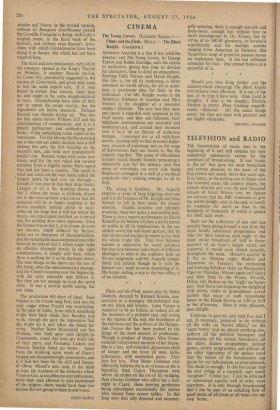The Young Lovers. (Leicester Square.) —
Flame and the Flesh. (Ritz.) The Black knight. (Gaumont.)
ANTHONY AsQurnt is a fine if not infallible director, and The Young Lovers, by George Tabori and Robin Estridge, suits his talents to perfection, giving him time to develop his characters, time to distil an atmosphere. Starring Odile Versois and David Knight, this film is, for all its tenderness, a bitter comment on world affairs, for all its quiet- ness, a passionate plea for faith in the individual. For Mr. Knight works in the American Embassy in London and Miss Versois is the daughter of a potential enemy's Minister. The very fact they meet and speak is regarded with suspicion in the rival camps, and they are followed, their telephone conversations are recorded and misinterpreted, and around their innocent love is built up an illusion of traitorous intrigue. Concerned not at all with State secrets, desiring only to find personal happi- ness, accused of espionage and on the verge of deportation, they are forced to flee the country together. The cause of officialdom is fairly stated, Joseph Tomelty presenting a reasonable case for the defence, and that sense of everybody on every side being hopelessly entangled in a web of a mythical somebody else's making emerges in all its folly.
The acting is faultless. Mr. Asquith employs a series of long lingering close-ups and it is the business of Mr. Knight and Miss Versois to fall in love under the closest scrutiny. Gentle, sensitive and infinitely touching, these two make a memorable pair. There is also a superb performance by David Kossoff as the heroine's father, a performance so subtle in all its implications, in the un- spoken word, the half-made gesture, that by tiny shades and touches he seems to lay bare his whole tragic life. That love between nations is imperative for world salvation but that love between individuals of different ideologies is tabu is the sophistry held up for our judgement, and Mr. Asquith, sympa- thetic and patient though he is with the human race, sends us away despairing of it. His happy ending, a sop to the box-office, is of no comfort.
Flame and the Flesh, screen play by Helen Deutsch, directed by Richard Brooks, con- centrates in a strangely old-fashioned way on sex, plain and impure. Lana Turner is supposed to be an Italian, as indeed are all the members of a polyglot cast, and owing to the rigours of the war, the beastliness of the Germans and the ardours of the Occupa- tion Forces she has been pushed to the fringe of the most ancient of professions. Though a product of despair, Miss Turner evidently enjoys every moment of her shame. She is a fine, well-rounded, glamorous child of hunger and she loves all men, indis- criminately, with unabashed gusto. They love her too. First Bonar Colleano who idiotically believes she is as virtuous as she is beautiful, then Carlos Thompson with whom she elopes on the eve of his wedding, then Charles Goldner who offers her a fort- night in Capri; these panting gentlemen being sidestepped occasionally for wolves who whistle from corner tables. In this long slow film ably directed and moment-
arily amusing, there is enough eye-talk and footy-footy, enough lust without love to merit investigation by Dr. Kinsey, but by virtue of its MGM glossiness, its heroine's superficiality and the multiple accents ranging from American to German, this Neapolitan soup of primitive passion leaves no unpleasant taste. It has not sufficient substance for that. One cannot believe in spoonful of it.
• • •
Should you love King Arthur and his clankety-clank entourage The Black Knight will increase your affection. It is one of the best of its type I have seen. Alan Ladd is doughty, if also a bit doughy, Patricia Medina is pretty, Peter Cushing magnifi-
cently villainous. All the usual things occur, but they are done with panache and are highly enjoyable.
VIRGINIA GRAHAM


































 Previous page
Previous page